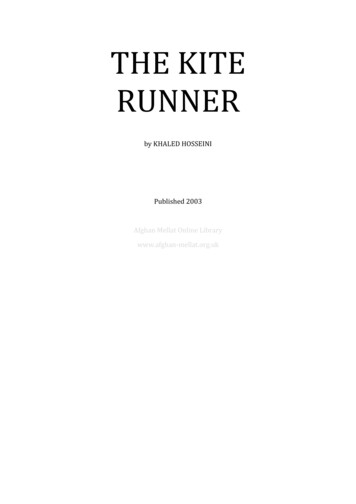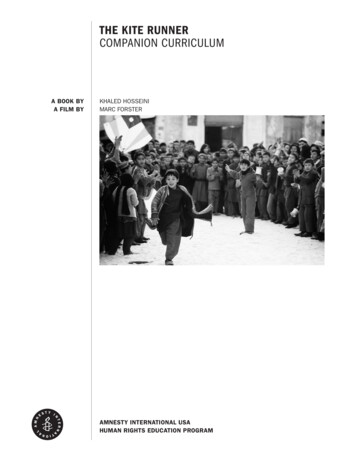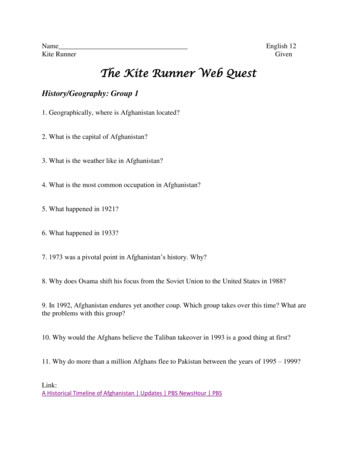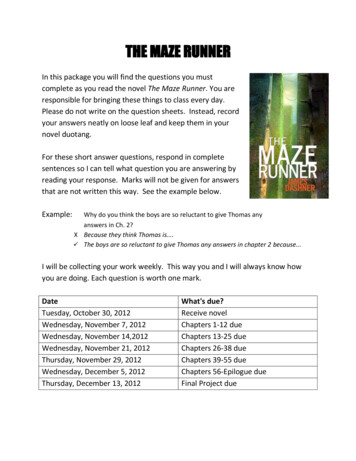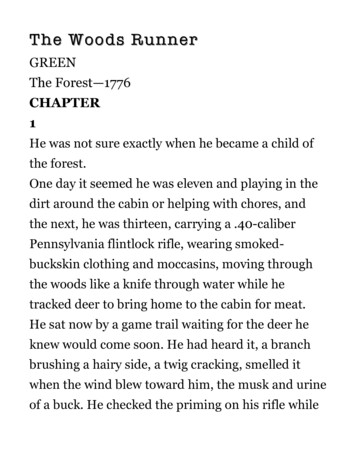
Transcription
The Woods RunnerGREENThe Forest—1776CHAPTER1He was not sure exactly when he became a child ofthe forest.One day it seemed he was eleven and playing in thedirt around the cabin or helping with chores, andthe next, he was thirteen, carrying a .40-caliberPennsylvania flintlock rifle, wearing smokedbuckskin clothing and moccasins, moving throughthe woods like a knife through water while hetracked deer to bring home to the cabin for meat.He sat now by a game trail waiting for the deer heknew would come soon. He had heard it, a branchbrushing a hairy side, a twig cracking, smelled itwhen the wind blew toward him, the musk and urineof a buck. He checked the priming on his rifle while
he waited, his mind and body relaxed, patient, earsand eyes and nose alert. Quiet. Every part of him atrest, yet focused and intense.And he pictured his life, how he lived in two worlds.Sometimes Samuel thought that a line dividingthose worlds went right through their cabin. To thewest, beyond the small parchment window made ofgrease-soaked sheepskin scraped paper-thin, lay theforest.The forest was unimaginably vast, impenetrable,mysterious and dark. His father had told him that aman could walk west for a month, walk as fast as hecould, and never see the sun, so high and dense wasthe canopy of leaves.Even close to their homestead—twelve acres clawedout of the timber with a small log cabin and a leanto for a barn—the forest was so thick that in thesummer Samuel could not see more than ten orfifteen yards into it. Some oak and elm and mapletrees were four and five feet in diameter and so tall
and thickly foliaged their height could only beguessed.A wild world.And while there were trails made by game andsometimes used by natives, settlers or trappers, thepaths wandered and meandered so that they wereimpossible to use in any sensible way. Except tohunt.When he first started going into the forest, Samuelwent only a short distance. That first time, thoughhe was well armed with his light Pennsylvania rifleand dry powder and a good knife, he instantly feltthat he was in an alien world.As a human he did not belong. It was a world thatdid not care about man any more than it cared aboutdirt, or grass, or leaves. He did not get lost that firsttime, because he’d marked trees with his knife as hewalked so he could find his way out; but still, insome way he felt lost, as if, were he not careful, apart of him would disappear and never return, gone
to the wildness. Samuel had heard stories of thathappening to some men. They entered the forest tohunt or trap or look for new land to settle andsimply vanished.“Gone to the woods,” people said of them.Some, he knew, were dead. Killed by accident, orpanthers or bear or Indians. He had seen suchbodies. One, a man mauled to death by a bear thathad attacked his horse while the man was plowing;the man’s head was eaten; another, killed by anarrow through the throat. An arrow, Samuel knew,that came out of the woods from a bow that wasnever seen, shot by a man who was never known.And when he was small, safe inside the cabin nearthe mud-brick fireplace with his mother and father,he had heard the panthers scream; they soundedlike a woman gone mad.Oh, he knew the forest could kill. Once, sitting bythe fire, a distant relative, a shirttail uncle who was avery old man of nearly fifty named Ishmael, had
looked over his shoulder as if expecting to seemonsters and said, “Nothing dies of old age in theforest. Not bugs, not deer, not bear nor panthers norman. Live long enough, be slow enough, get oldenough and something eats you. Everything kills.”And yet Samuel loved the forest now. He knew thesounds and smells and images like he knew his ownmind, his own yard. Each time he had entered he’dgone farther, learned more, marked more trees withhis knife, until he always knew where he was. Nowhe thought of the deep forest as his home, as muchas their cabin.But some men vanished for other reasons, too.Because the forest pulled them and the wild wouldnot let them go. Three years ago, when Samuel wasten, he had seen one of these men, a man whomoved like smoke, his rifle a part of his arm, atomahawk through his belt next to a slab-bladedknife, eyes that saw all things, ears that heard allthings. One family in the settlement had a room on
their cabin that was a kind of store. The man hadcome to the store to buy small bits of cloth andpowder and English flints for his rifle at the sametime Samuel was waiting for his mother to buythread.The man smelled of deep forest, of smoke and bloodand grease and something green—Samuel knew hesmelled that way, too. The stranger could not bestill. As he stood waiting, he moved. Though he wascourteous and nodded to people, as soon as he hadthe supplies for his rifle and some salt, he left. Hewas there one moment and gone the next, into thetrees, gliding on soft moccasins to become part ofthe forest, as much as any tree or leaf or animal. Hewent west.Away from man, away from the buildings and thesettled land.Now Samuel heard a new sound. He moved his eyesslowly to the left without turning his head and wasrewarded by seeing a tick-infested rabbit sitting by a
tree trying to clear the insects out of his ears.Samuel smiled. Even in dead of winterthe rabbits were always trying to rid themselves ofthe pests.The sight made him think of his mother, who wasintensely curious and had once asked him to takeher into the forest. They had not gone far, not overfive hundred yards from the edge of the clearing,and had stopped under a towering oak wheresunlight could not get through. There was a subduedgreen light over everything. Even their faces lookeda gentle green.“I have to go back,” she said, her eyes wide,wrapping a shawl tightly around her shoulders,though it was summer-warm. “This is too too thick. Even the air is green. So thick it feels like itcould be cut. I have to go back now.”Although Samuel’s parents lived in the wilderness,they were not a part of it. They had been raised intowns and had been educated in schools where
they’d been taught to read and write and playmusical instruments. They moved west whenSamuel was a baby, so that they could devotethemselves to a quiet life of hard physical work andcontemplation. They loved the woods, but they didnot understand them. Not like Samuel.They had told their son that they didn’t belong intowns, either. They weren’t comfortable in the worldof roads, houses and villages. East of the imaginaryline in the cabin was what his father and mothercalled civilization.They told Samuel about the chaos of towns thatthey’d escaped. There were noises—hammersclanging at blacksmith forges, chickens clucking,dogs barking, cows lowing, horses whinnying andwhickering, people who always seemed to need to betalking to one another.There wasn’t noise in the forest.There were smells: wood smoke filled the air inevery season because it wasn’t just for heat, but to
cook as well; the smell of oak for long fires, pine forshort and fast and hot fires. The smell of bread, andsometimes, if they were lucky andhad honey or rock sugar to pulverize in a sack with ahammer, sweet pie. The odor of stew cooking in thecast-iron pot over an outside fire or in an iron kettlehung in the fireplace, the scent flying up through thechimney and out over the ground as the wind movedthe smoke around. There was the tang of manure,stacked in back of small shedlike barns to age beforeit was put on gardens; horse and cow and chickenmanure from their farm and other farms. So manysmells swirled by the same wind throughout thesmall valley.Their valley was like a huge bowl, nestled in the hillsin far western Pennsylvania. Here lived, and hadalways lived, Samuel Lehi Smith, age thirteen, withhis father, Olin, and his mother, Abigail, parentswhom Samuel did not always understand but whomhe loved.
They read to him about the world beyond from theirprized books. All the long winter nights with tallowcandles burning while they sat by the fireplace, theyread aloud to each other. At first he’d listened asthey took turns. Later he read to himself and knewthe joyous romp of words on paper. He read allthe books they had in the cabin and then books fromother cabins in the valley so that he could knowmore and more of a world found only in hisimagination and dreams.To the east lay the faraway world of enormous citiesand the Great Sea and Europe and Ancient Romeand Darkest Africa and the mysterious land ofthe Asias and so many people they couldn’t becounted. All kinds of different people with foreignlanguages and their knowledge of strange worlds.To the east lay polished shoes and ornate clothesand formal manners and enormous wealth. Hismother would spin tales for him about cultured menwho wore carefully powdered wigs and dipped snuff
out of little silver snuffboxes and beautiful womendressed in gowns of silk and satin with swirlingpetticoats as they danced in the greathouses andexclusive salons of London and Paris.Now. The deer stepped out. It stood in completeprofile not thirty yards away. Samuel held hisbreath. He waited for it to turn away, look around incaution. When it did, he raised the rifle and cockedthe hammer, pulling it back as quietly as he could,the seardropping in with a soft snick. The rifle hadtwo triggers, a “set” trigger that armed a second,front trigger and made it so sensitive that a merebrush released the hammer. He moved his fingerfrom the set trigger and laid it next to butdidn’t touch the hair trigger. Then he settled theGerman silver blade of the front sight into the tinynotch of the rear sight and floated the tip of theblade sight until it rested just below the shoulder ofthe young buck.Directly over its heart.
A half second, no, a quarter second passed. Samuelcould touch the hair trigger now and the hammerwould drop, the flint would scrape the metal“frizzen,” kicking it out of the way and showeringsparks down on the powder in the small pan, whichwould ignite and blow a hot jet of gas into the touchhole on the side of the barrel of the rifle, setting offthe charge, propelling the small .40-caliber balldown the bore. Before the buck heard the sound ofthe rifle, the ball would pass through the heart andout the other side of the deer, killing it.And yet he did not pull the trigger. He waited. Partof a second, then a full second. And another. Thedeer turned, saw him standing there. With aconvulsive explosion of muscle, it jumped straight inthe air. It landed running and disappeared into thetrees.The whole time Samuel had not really been thinkingof the deer, but what lay east. Ofwhat they calledcivilization. He eased the hammer of the rifle down
to the first notch on the sear, a safety position, andlowered the weapon. Oddly, he wasn’t disappointedthat he’d not taken the deer, though the fresh meatwould have been nice roasted over the hearth. He’dkilled plenty of deer, sometimes ten or fifteen a day,so many they could not possibly eat all the meat. Heoften shot them because the deer raided thecornfields and had to be killed to save the crops.Most families did not like deer meat anyway. Theyconsidered it stringy and tough and it was oftenwormy. The preferred meat was bear or beaver,which were richer and less “cordy.”This deer would have been nice. They had not hadfresh meat in nearly two weeks. But it was gone now.He could not stop his wondering about what lay tothe east. The World. It was supposed to be a betterplace than the frontier, with a more sensible way tolive. And yet he had just learned an ugly truth aboutthat world only the evening before.
Those people in the world who were supposed to becivilized, full of knowledge and wisdom andgraciousness and wealth and education, were caughtin the madness of vicious, bloody war.It did not make any sense.Samuel started trotting back toward the cabin in aneasy shuffle-walk that moved him quietly and atsome speed without wearing out his moccasins; hewas lucky to get a month per pair before they worethrough at the heels.He moved without a great deal of effort, his eyes andears missing very little as he almost flowed throughthe forest.But his mind was still on the man who had broughtthe sheet of paper the night before.CommunicationIn the year 1776, the fastest form of travel for anydistance over thirty or forty miles was by ship. With
steady wind, a sailing vessel could clock one to twohundred miles a day for weeks on end.A horse could cover thirty, maybe even forty, miles aday, although not for an extended period withoutbreaking down.At best, coaches could do a hundred miles in atwenty-four-hour day by changing horses every tenor fifteen miles, but only if the roads were in goodshape, which they almost never were.A man could walk twenty or thirty miles a day—faster for short periods, but always dependingon conditions of land, weather and footgear. Fifteenmiles a day was standard.So there was no fast and dependable way totransmit information in those years—no telegraph,no telephone, no Internet, no texting,no overnight delivery services.It might take five or six days for knowledge of animportant event to move just ten miles, carried by atraveler on foot. Settlements were twelve to fifteen
miles apart. And information was carried by handfrom person to person on paper or, in most cases,shared by word of mouth.CHAPTER2Samuel had returned home from the forest the nightbefore and found his parents sipping tea with Isaac,an old man of the forest who stopped by their cabinevery few months while he was hunting. This time,though, he had news. He carried information abouta fight in Lexington and Concord, Massachusetts,where militia had fired on and defeated Britishsoldiers. The battle had happened months before, allthe way back in April of 1775.Isaac seemed to be made entirely of scraps of oldleather and rags. He was bald and wore a ratty cap
with patches of fur that had been worn away. He wastall and thin and for many years had lived in a cabinsome twenty miles to the east. He was so much apart of the forest that even his brief visits withSamuel’s family caused him discomfort.He’d decided to move farther into the frontier whena wagon, pulled by oxen, came into the clearing nearhis cabin. The family was traveling westward,looking for a piece of land to farm, and had chosen aspot not far from Isaac’s place.The family was, Isaac said, “a crowd. And I knew itwas time to move on, seeing as how I don’t doparticular good with crowds of people.”As he was taking his leave from the small shackwhere he had lived, the family had given him thescrap of paper, soft with wear from all the hands ithad passed through, so he could share the news withfellow travelers he met on his journey. They told himof other events they had heard of along the way. He
tried to remember the details, but admitted that hewasn’t much for conversation.“Since they was so much noise from the sprats as itseemed a dozen of them, my thinker fuzzed up likebad powder and my recollecter might not be all itcould be, but I think they said they was another fightat a place called Bunker Hill and the patriot militiagot whipped there and sent running when they sawthe bayonets on the British soldiers’ muskets.”He sat, quietly sipping the evergreen tea he alwayscarried, a brew made from pine and spruce needles.He swore it cured colds, and he said he preferred itover “furriner tea from outside, but thankee,missus.”The paper he’d handed to Samuel’s father, Olin,was a single sheet that had been folded and unfoldedso many times it was near to falling apart. It hadbeen printed on a crude press with wooden blockletters and was smudged and hard to read. But therewas a brief description of the fight at Lexington and
Concord and a drawing of figures firing muskets atsome other figures that were falling to the ground.As Samuel studied the paper in his father’s hands,he thought: Everything in my world just got bigger.Two other families, the Clarks and the Overtons,pulled up in wagons. Isaac had spoken to them onhis way to Samuel’s place and they wanted to hearwhat Olin had to say about Isaac’s news.Samuel looked around the small cabin on the edgeof the woods that was suddenly filled with people alltalking over each other about the meaning of thebattles. It seemed that the strong and sturdy logwalls no longer protected his family. The loudoutside world his parents had escaped by moving tothe frontier had found them. Samuel was excitedand frightened and overwhelmed all at the sametime.“What does it mean?” Ebenezer Clark asked Olin.His face was red and round as an apple because he
drank home beer, three quarts every morning forbreakfast.“It could be local. Just some trouble in Boston,”Samuel’s father said. “A riot or the like. There’salways a chance of rabble-rousing in the cities. Andit doesn’t seem likely that a group of farmers wouldtry to take on the entire British army.” He paused,then added thoughtfully, “England has the mostpowerful army and navy in the world, and a gaggleof farmers would have to be insane to fight them.”“Likely or not”—this from Lund Harris, a softspoken and careful man whose wife, Clara,sat nursing an infant—“if it happens, we have tothink what it means for us out here on the edge.”Nobody spoke. Samuel could hear the crackle of thefire in the fireplace. In the homey, safe cabin, thecraziness of the information from the east seemedimpossible.There was always some measure of violence on thefrontier: marauding savages, drunks, thieves—
“evildoers,” men who operated outside the walls ofreason. Harshness was to be expected in the wild.But nothing like this, nothing that challenged theestablished order, the very rule of the Crown, thecivilized life that came from the English way ofliving.The very idea of fighting the British was too big tounderstand, too huge to even contemplate. Thesesettlers had always been loyal to the rules of theland, obedient to the laws of the country that ruledthem.Ben Overton stood. He was a tall, thin man whosesleeves never seemed to come to his wrists. He said,“Well, I think we should do nothing but wait and seehow the wind blows.”And with nods and a few mumbles of affirmation therest got up and went back to their own homes.Not a single person in that cabin could have knownwhat was coming. And even if they had seen the
future, they would not have been able to imagine thehorror.Frontier LifeThe only thing that came easy to people of thefrontier was land. A single family could ownhundreds, even thousands of acres simply byclaiming them.If getting the land was easily accomplished, usingthe land was a different matter. It had to be clearedof trees for farming. Some oaks were five or six feetin diameter, and each had to be chopped down byax, cut into manageable sections and hauled off.Then the stump was dug out of the ground, oftenwith a handmade wooden shovel. One stump mighttake a week or two of hard work, and a piece of landcould have tens of dozens of trees.If a family was lucky they might find a clearing leftby beavers, which log off an area and dam a creek tomake a lake, rotting out all the stumps. When the
trees and the food are gone, the beavers leave, thedam breaks down, the water drains off and there is ahandy clearing left where the lake was.
CHAPTER3The woods were never completely quiet.Even in silence, there would be a whisper, a softchange that told something. If you listened,complete quiet could speak worlds.Samuel had gone five ridges away from home,hunting, feeling the woods. Something was off. Ifnot wrong, then different. The woods felt strange, asif something had changed or was about to change.Samuel shrugged off the feeling and kept going. Itwas hard to measure distance, because the ridgesvaried in height and width and the forest canopyblocked out the sun. He was hunting bear, so hemoved slowly and followed the aimless game trailslooking for signs of life.Five ridges, going in a straight line, might havemeant four or five miles. The wandering path hefollowed probably covered more like seven or eight.
He had seen no fresh sign until he came halfway upthe fifth ridge, a thickly forested round humpshaped like the back of a giant animal. Then he sawfresh bear droppings, still steaming, filled with berryseeds and grass stems, and he slowed his pacethrough the thick undergrowth until he came to thetop of the ridge. To his surprise, the trees were gone,and he could see miles in all directions.He had hunted this direction many times, but hadnever reached this ridge before. The thickundergrowth in the summer and early fall had kepthim from seeing this high point. He was amazed tofind that below him on the western side of the ridgelay a small valley perhaps half a mile long and aquarter mile wide. The graceful chain of roundmeadows and lush grass was already perfectfarmland. The treeless patch just needed rail fencingand a cabin to be complete.“Perfect,” he said aloud. “Like it was made to beused.”
A crunching noise to his rear, to the east, broughthim around. The bear was forty or so yards away, ayearling, slope-shouldered, dark brown more thanblack. Like a large dog, it was digging in a rottenstump on the edge of the clearing. Samuel cockedhis rifle, raised it and then held. He looked above thebear across the tops of trees.Smoke.Thick clouds of smoke were rising to the east, almoststraight to the east, a goodly distance away. Forestfire? But it wasn’t that dry and there had been nothunderstorms, the normal cause of forest fires.Then he remembered that their neighbor Overtonwas going to burn limbs and brush from trees hehad felled and cleared. The direction and distancelooked about right for the settlement.The bear moved, stood and looked at him, thendropped and was gone without Samuel’s firing.Another missed kill.
The smoke was in the right direction and atthe probable distance, but there was somethingwrong with it, the way there had been somethingwrong with the feel of the woods today.He eased the hammer down on his rifle and loweredthe butt to the ground. He stood leaning on it,studying the smoke the way he would read sign froma wounded animal, trying to see the “why” of it.The gray smudge was wide, not just at the base butas it rose up, too wide for a single pileof slash. Thatcould be explained by wind blowing the smokearound.But it was a still, clear day.All right, he thought, so Overton set fire to the slashand it spread into some grass and that made itwider. But the grass in the settlement area had beengrazed to the ground by the livestock and what wasleft was still green and hard to burn.And would not make a wide smoke.
Would not make such a dark, wide smoke that itcould be seen from how far?Maybe eight miles?Smoke that would show that dark and that widefrom eight miles away on a clear, windless day hadto be intentional.He frowned, looking at the smoke, willing it to notbe what was coming into his mind like a dark snake,a slithering horror. Some kind of attack. No. Heshook his head.No.There had been years of peace. Even with a war, areal war, starting back east in the towns and cities, itwould not have come out here so soon; it had onlybeen a week since they’d heard the news.It could not come this soon.But even as he thought this, his mindwas calculating. Distance home: eight miles in thickforest. Time until dark: an hour, hour and a half. Nomoon: it would be hard dark.
Could he run eight miles an hour through the woodsin the dark?It would be like running blind.An attack.Had there been an attack on the settlement, onhis home?He started running down the side of the ridge. Not acrazy run, but working low and slipping into thegame trails, automatically looking for a turn or shiftthat would take him more directly home.Home.An attack on his home.An attack on his mother and father?And he had not been there to help.Deep breaths, hard, and deep pulls of air as heincreased his speed, moccasins slapping the ground,rifle held out in front of him to move limbs out ofthe way as he loped through the forest. The greenthickness that once helped him now seemed toclutch at him, pull him back, hold him.
An attack.And he had not been there to protect his parents.
The Woods Runner Ch. 4PART 2REDWar—1776WeaponsA single rifle—something every frontier family needed, somethingthat was an absolute necessity—might take a year or more, and ayear’s wages, to get from one of the rare gunsmiths, locatedperhaps miles away.This was the only weapon many of the rebels carried intobattle against the British.The firearm issued to the British army was called the BrownBess musket. It was a smooth bore and fired a round ball of .75caliber, approximately three-quarters of an inch in diameter, witha black-powder charge, ignited by flint, that pushed the ball atseven or eight hundred feet per second when it left the muzzle(modern rifles send the bullet out at just over three thousand feetper second).Because a round ball fired from a smoothbore is so pitifullyinaccurate—the ball bounces off the side of the bore as itprogresses down the barrel—the Brown Bess was really only goodout to about fifty yards. The ball would vary in flight so widely
that it was common for a soldier to aim at one man coming at himand hit another man four feet to the left or right.With the Brown Bess, each British soldier was issued a bayonet,nearly three feet long, that twist-locked to the end of the barreland turned the empty weapon into a kind of attacking pike.Along with personal weapons, the British army employed artillery,small field cannon, which fired plain round balls, exploding shellsand grapeshot: scores of round musket balls packed down thebore to make the cannon into something like a giant shotgun.Grapeshot was so viciously effective against columns of marchingmen that its destruction would not be duplicated until the use ofthe rapid-fire machine gun in the First World War. Whole ranksof attacking men could be taken down in a single shot.
CHAPTER4Samuel smelled it before he saw anything.Not just the smoke from the fires. But the thick, heavy smell.Blood. Death.No.The single word took over his brain. Part of his thinking wasautomatic, leading him to act with caution, move with stealth. Butthe front part, the thinking part, hung on one word.No.He’d made good time, running hard until his lungs seemed to beon fire, then jogging until he got his breath, then back to the fullout run. There was probably another half hour of daylight beforeit was too dark to see. As he approached the settlement he slowedand moved off to the side. It would do no good to run head-on ifthe attackers were still there.He was silent, listening keenly. Surely if anyone was still therethey would make some noise. All Samuel heard was the cracklingof fire, the soft night sounds of evening birds.No human sound.At the edge of the clearing near his home he paused, frightened,no, terrified at what he would find. He was hidden in some
branches and he studied the area through the leaves to make sureit was clear before he stepped out.The cabin was gone. Burned to the ground, side shed and all. Hereand there an ember flickered and crackled and smoke rose intothe evening sky but the building was no more.In the distance he could see that the other cabins, scatteredthrough the clearing, had been burned as well. Dreading what hemight find, he forced himself to search the ashes, looking for theslightest indication of bodies.He could not bring himself to think about what he was reallylooking for: his parents. His brain would not allow it, though heknew the death smell came from someone. He could not allowhimself to believe it was from them, from Mother and Father.He found nothing in the ashes. And when he spread the searchout around the cabin, moving in greater circles, he still found notrace that might have been his parents.But as the search loop widened, he began to come across bodies—his neighbors, shot down, lying on the ground. Dead. They werepeople, friends and families he had known. A frantic need tookhim, the thought that the next body might be the one he dreadedmost to find, and he ran from one to another trying to identifythem in the failing light.
Overton lay by his cabin, lifeless, his shirtsleeves still not down onhis wrists. Eyes closed, and no breath coming from his lips. Noteven he could escape the wrath of the savages.Samuel ran from body to body in the gathering twilight until atlast there were no more bodies to find. No matter how fast he ran,how wide he ran, he did not find his parents. Along with six orseven others, they had not been killed, or at least not been killedhere. They had been taken away. They had not been killed. Heclung to that thought—they had not been killed.He stood, his breathing ragged, sobbing softly. Twice he hadthrown up, and the smell and taste mixed with the tears offrustration and grief for his friends, and rage for what had beendone to them. He knew that if he lived to be a hundred, he wouldnever lose the taste, the smell or the images of what he had seen:the madness of what men could do to other men in savage rage.Dark caught him now. He had circled through the settlement andwas back at his own cabin, or where it had been. There wasnothing left that would furnish light; all of the candles hadmelted. But he trapped some of the embers that were still glowingand made a campfire off from the cabin a bit. In its light he foundthe woodpile, which, oddly, had not been burned, and at the sideof the pile there was a stack of pine-pitch knots and roots that hismother had used to start fires. The pitch concentrated in the knots
burned with a smoky hot flame that lasted for an hour or moreand would work as a torch. Near the garden plot he found the oakshovel they had used to turn the earth for gardening. Theattackers had overlooked it or left it as useless, because anythingof value had
gone farther, learned more, marked more trees with his knife, until he always knew where he was. Now he thought of the deep forest as his home, as much as their cabin. But some men vanished for other reasons, too. Because the forest pulled them and the wil







